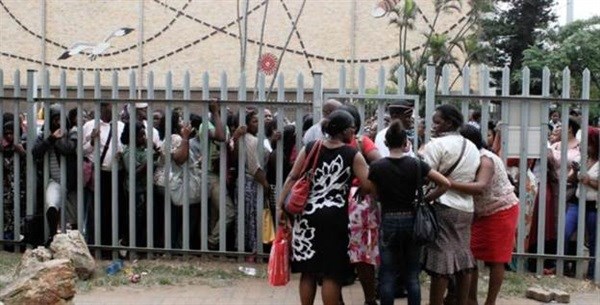
Top stories





Energy & MiningGlencore's Astron Energy gears up with new tanker amidst Sars dispute
Wendell Roelf 11 hours

More news


















Logistics & Transport
Uganda plans new rail link to Tanzania for mineral export boost










Twenty two years later, the scene is the same. However, the disposition of those who occupy the ‘queue’ seems to reflect a sense of despondency. The images of euphoria of the past are seriously lacking. It is not a picture of hope. Indeed it is a sombre sight. The majority of those waiting patiently in the sun drenched ‘line’ are still black, reflecting a national problematique – failure in service delivery. In this case a lack of access to public higher education. The demand for seats at universities far outstrips supply and that despite government’s legitimate attempts to massify the higher education sector. The questions of access, affordability and equity linger on for the majority of black higher education hopefuls. Year in and year out we hear of the multitude of matriculants who are denied access to our universities. The problem seems to worsen annually, especially in terms of the number of youth who are denied access to university education.
The scene mentioned above is not an isolated or coincidental experience, but the product of years of inequality of opportunity. Although we are a more than twenty years into democracy, the echoes of an apartheid cum post-apartheid legacy seems to reverberate through the psyche of disadvantaged people. South Africans are constantly reminded about the mismatch between demand and supply for places in higher education institutions. We become witnesses to heart-wrenching stories of students who are denied access to a higher education institution because there is either a lack of place or finance to educate aspiring minds – a tragedy of our time, especially when one realises the importance of skills required in the development of our country.
We wish to call this a systemic failure. The state it would seem is unwavering in its disposition that the provision of higher education is its sole prerogative – in sharp contrast to other more developed and emerging economies where partnerships between the state and all other stakeholders have significantly addressed the perennial question of the mismatch between demand and supply in higher education through innovative strategies and partnerships. Disadvantaged black people continue to suffer. They wait in soul-destroying ‘queues’ expectant that they will be fortunate enough to be selected for a place at one of our higher education institutions. In most instances both the parents and aspiring youth know full well that failure to gain access could relegate both the higher education hopefuls and their families to the poverty heap of obscurity and add to gross inequality in the country – giving credence to the old adage that ‘poverty begets poverty’.
Whilst finance and a lack of university infrastructure are the primary factors, the obstinacy of the state in dealing with the predicament seems to be a new overriding attribute. There is clearly a discernible dissonance in public discourse on this subject, particularly from students, civil society organisations and private higher education providers. The recent #feesmustfall campaign adds further credence to this view. The crisis, whilst structural, is symptomatic of a deeper malaise, related to two primary constraints of the system – the inability of government to financially meet the burgeoning demand for higher education and the existence of a flawed, overly rigid and an ineffective regulatory stance on the part of the ministry. It is a posture that borders on arrogance.
There has to be a will on the part of government to resolve a crisis of national proportion. As a nation we owe it to our younger generation. Our youth need to be enskilled to provide the necessary threshold of opportunity for development in South Africa. The time is now ripe for new nexus of relationships to emerge to tackle the dramatic expansion of students demanding access to higher education in South Africa.
The crisis of the mismatch between demand and supply requires a new approach to our critical understanding of the complexity of the question of access in this country. It should cajole us to explore new and innovative solutions to address the problematique and in this respect public-private partnerships in higher education become crucial.
We would like to recommend that the department of higher education and training in South Africa invokes the principal of a Social Contract within the constructs of a development state. The success of this social contract will depend on the active involvement of all stakeholders – a strong emphasis on building a broad front and partnership between the government, the private sector and civil society. Even the World Bank and other BRICS nations endorse such a strategy.
The time, therefore, has come to confront an ‘inconvenient truth’. We need to boldly traverse new ‘terrains’ in the provisioning of access to higher education that are proving to be the most plausible resolution to an incommodious problem.